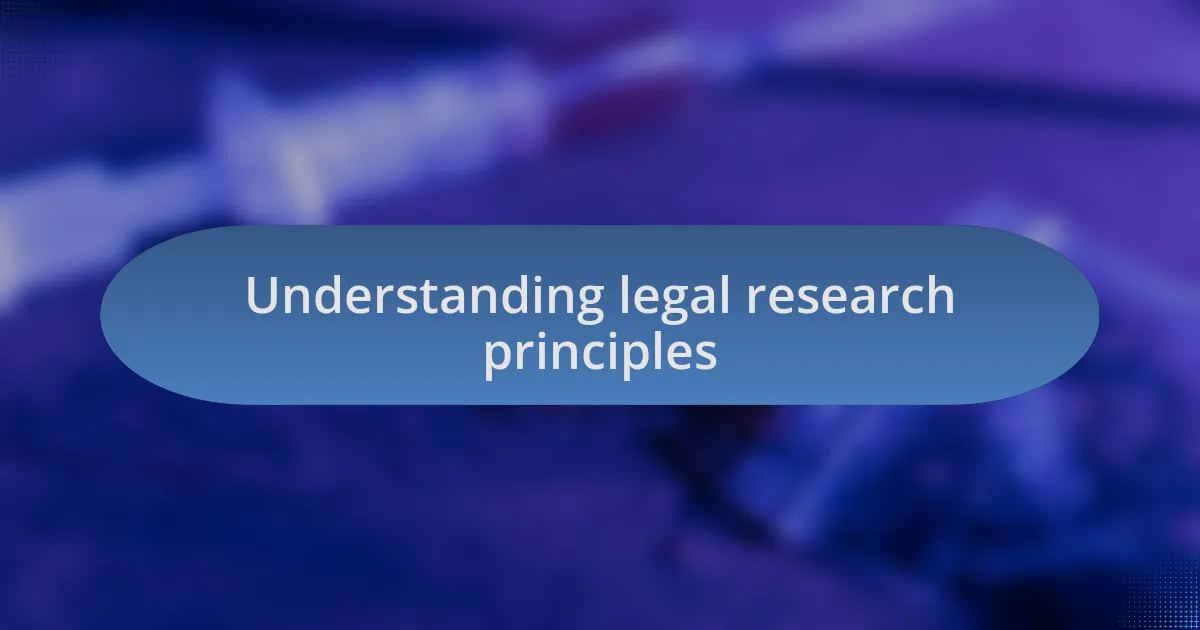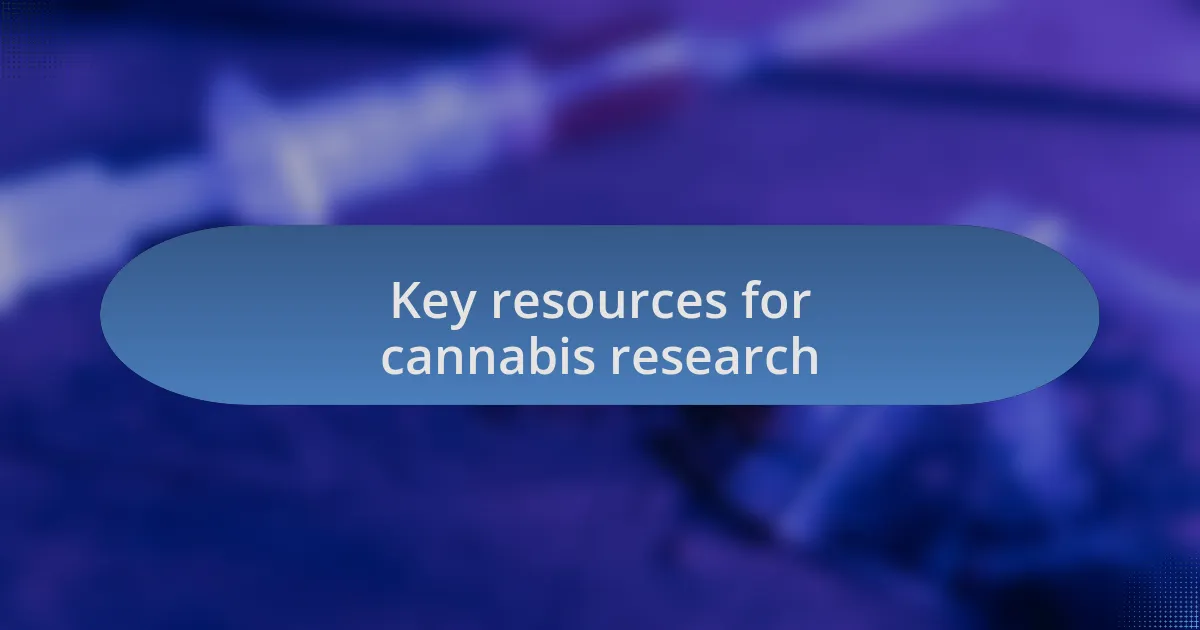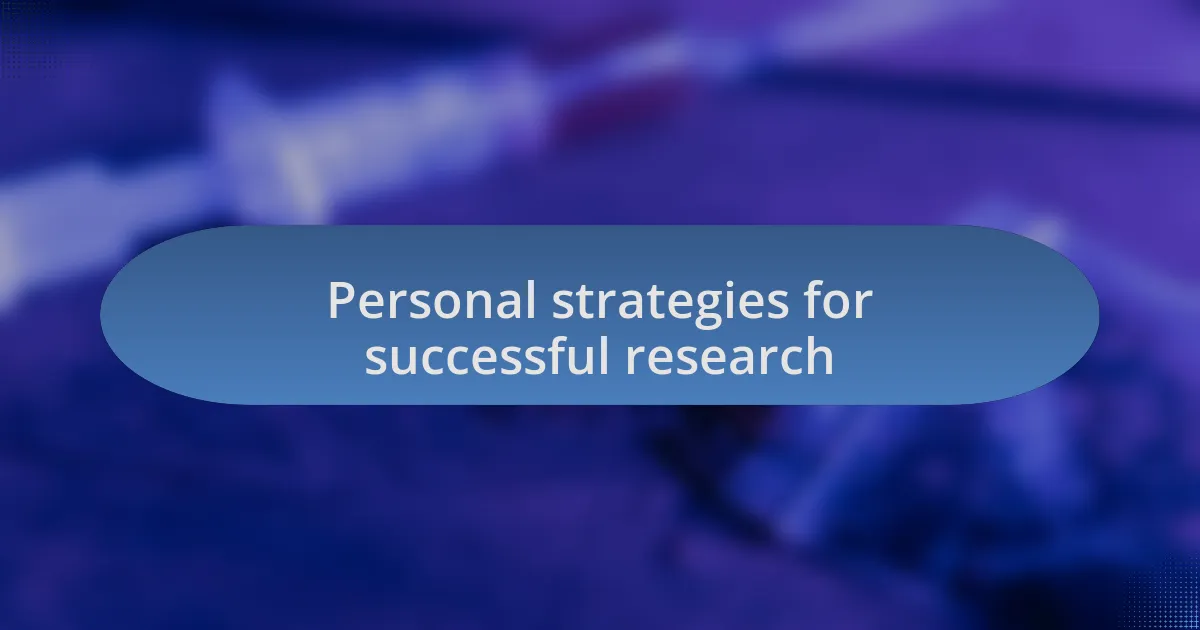Key takeaways:
- Starting with a clear research question narrows focus and improves efficiency in legal research.
- Utilizing comprehensive legal databases like Westlaw and government websites is vital for accessing current cannabis regulations and case law.
- Organizing research findings with digital tools enhances clarity and helps identify connections within complex information.
- Networking with industry professionals provides valuable insights that can deepen understanding of legal issues and compliance.

Understanding legal research principles
Understanding legal research principles is crucial for navigating the complexities of cannabis law. I remember during my first research project, I felt overwhelmed by the sheer volume of regulations and case laws. It prompted me to ask myself: how do I filter through this information effectively?
The key lies in grasping the foundational concepts of legal research. I learned that starting with a clear research question not only guides your search but also helps you narrow down the vast ocean of legal texts. This approach allowed me to focus on specifics and avoid getting lost in irrelevant details.
Moreover, understanding the hierarchy of legal sources—statutes, case law, and regulations—was a game-changer for me. It felt empowering to know where to find the most authoritative material first. Have you considered how varied jurisdictions can impact your research? The different regulations can be daunting, but recognizing recognized legal frameworks can really streamline your process and lead you to relevant conclusions faster.

Key resources for cannabis research
When diving into cannabis research, I found that legal databases like Westlaw or LexisNexis are indispensable tools. The first time I accessed these platforms, I was amazed by the depth of information available at my fingertips. It felt like stepping into a treasure trove; everything from case law to secondary sources was just a keyword search away. Have you ever experienced that exhilarating moment when you unearth a pivotal case that changes the direction of your research? It’s moments like these that reinforce the importance of utilizing comprehensive databases.
Additionally, I often turn to government websites for the latest updates on cannabis regulations. Initially, I underestimated these sources, thinking they would be dull and filled with legal jargon. However, I quickly recognized that they are incredibly valuable for understanding local and national laws as they evolve. Have you ever checked your state’s cannabis board for updates? I remember finding updates on policy changes that shaped my understanding of compliance and legal practices. Those insights not only informed my research but also made the complexities of cannabis law feel more tangible.
Lastly, industry-specific publications and journals provide rich context beyond just the legal text. I remember discovering publications dedicated to cannabis business practices and emerging market trends, expanding my perspective beyond mere legality. Have you explored these resources? They add a layer of understanding about how regulations play out in real-world contexts, connecting legal principles with practical implications. This blend of legal analysis and industry insight has often guided my research direction, amplifying its relevance in today’s dynamic cannabis landscape.

Personal strategies for successful research
When it comes to legal research, one strategy I’ve found essential is creating a structured approach to organize my findings. I often use digital tools like OneNote or Evernote to categorize information by themes or topics, ensuring easy access to relevant data later on. Have you ever felt overwhelmed by a mountain of information? I have, and organizing it visually has made the process so much smoother and helps me see connections I might have otherwise missed.
Additionally, I prioritize networking with professionals in the cannabis field. Engaging in conversations with lawyers, regulators, and industry experts has provided me with invaluable firsthand insights. I remember one interaction that illuminated a complex legal issue surrounding product labeling; it made me realize how different interpretations could impact compliance. Have you considered leveraging your connections in the industry? Those discussions often lead to perspectives that can greatly enhance the quality of your research.
Lastly, I embrace flexibility in my research methodologies. For instance, I might start with a conventional literature review but then pivot to case studies when I come across a particularly intriguing legal precedent. This adaptability allows me to follow the thread of inquiry wherever it leads, often uncovering hidden gems that radically shift my understanding. Have you ever stumbled onto something unexpected during your research? Those serendipitous moments can be the most rewarding, and embracing them has become a hallmark of my research strategy.